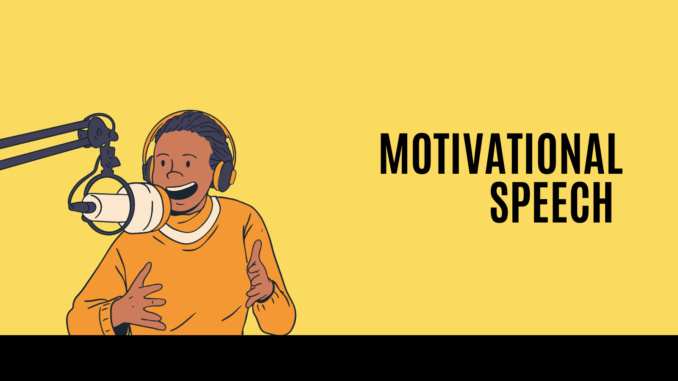
A motivational speech is an informative message delivered to a group of targeted audiences from one’s prior experience. Knowing how to prepare a motivational speech can be beneficial for you to communicate publicly. Some also take this as a profession where they are required to visit institutions or attend interviews to deliver motivational speeches.
The topics can be about anything where you express your earlier experiences and mention the challenges and opportunities. This can be inspiring for your target audience who face a similar situation. However motivational speech is not something that you can express without aligning with your audience’s situation. You need to follow a certain format to create one before conveying it to your audience.
Motivational speeches can be for everyone. Motivational speeches for students, entrepreneurs, employees, and working people are common. However, every motivational speaker has the same common goal, which is to inspire their audience. You can deliver your motivational speech in English, Hindi, or any language depending on your audience’s understanding.
At an international level, since English is the primary level, you will have to be confident with the language. As a motivational speaker, your communication skills are expected to be strong enough to influence the audience.
A few steps that you can follow while preparing a motivational speech are mentioned below:
Steps to Write an Amazing Motivational Speech
Determine your purpose
Before preparing your speech, you need to identify the purpose of your speech. Your purpose of the speech will be described throughout the rest of the speech. Once you have decided on your topic, you can write the rest part of your speech around that particular message. Some of the common themes that you can deliver your speech include:
1. You can talk about the benefits of smart working.
2. The importance of building a positive mindset for any work.
3. Or the secrets of making dreams into reality.
4. And lastly, suggestions on overcoming stress at work.
Know your target audience
For considering any work for the public, you should know your audience first. It is helpful for you to plan your speech accordingly. Researching your audience demographics is the most considerable step, like their age group, interests, and education.
Preparing the speech in the right format can help you make strong connections with your audience. But you should also know that your audience may feel bored when you give a long speech. You should prepare short motivational speeches and find ways to make them energetic for the audience.
The speech should be more of empathy with a purpose. Before you write a speech make a self-assessment with questions like:
1. Are the audience interested in your topic?
2. Are they able to understand what you are trying to deliver?
3. Can they relate to what you are saying?
4. Are you giving enough examples to motivate them?
Start with a practice
It is always better to practice something beforehand than to present it directly to the public. You can begin by preparing a rough draft. Decide the type of points you think can be more beneficial for your audience.
Prepare the introductory part more excitingly so that your audience participates from the beginning. Some writers make use of hooks to engage their audience and to pull their attention. Some of the strategies you can apply to hook your audience are:
1. Ask questions- You can start your speech with rhetorical questions that will allow them to think about your topic before you start your whole speech. For instance, if your theme is about work stress, you can start with a question like “Have you ever thought about what makes you feel stressed at your workplace?”
2. Use any facts or statistics- You can include facts and statistics in your introductory topic. If your story is related to overcoming stress your hook can be “every time someone at work becomes so stressed regarding their job that they can’t complete their daily tasks properly”.
3. Start with an anecdote- In simple terms, an anecdote is a short personal story about your life that can relate to the topic. An anecdote can help you to explain your theme before you directly mention what is it about.
4. Make use of words like “imagine” or phrases like “what if”- Words like imagine can inspire your audience to create a story in their mental image at that moment itself. Also, you can start your speech with “what if” which can invite your audience to follow your thought process.
For example, you can use words like, “Imagine reaching your work goals without putting much effort” or “What if everyone at your workplace was capable of completing a big task in a small amount of time.”
Writing a motivational speech is not an easy task. You may be good at giving motivational talks but not good enough for writing them. Situations like this can make you feel exhausted. Experts from “do my assignment” are always ready to help in such cases.
There are highly trained professionals who have prior experience in writing assignments, resumes, and motivational speeches. By getting their help you can ask them to write speeches for you anytime. You can give them your topics, and they ensure you deliver the assigned work within a short time.
Add narrative to your speech
After starting with your introduction, try to include personal narratives. This will allow you to build a connection with your audience at a more personal level. Later this can be more interesting to link your narrative with the rest of the speech.
A few of the different approaches that you can use while adding a story to your speech are-
“The journey of the hero” – Like this, you can take your audience to the start of the journey. At the initials, you begin by including exposition and then meet a challenge and end the challenge by overcoming that challenge.
Another one is “rags to riches”- This method focuses on success stories that involve how you started from an underprivileged situation to make it to a success path through hard work and perseverance.
Add call to action
When you feel you have reached the conclusion and convinced the audience of the intentions you had, end the speech with a call to action. Try to end your session with strong words that can motivate them and the impact of your motivational speech.
Assignment help Online can get you access to many resources related to motivational speaking. These resources provided by them are reliable and easy to understand. Their resources have helped a lot of spokespersons earlier.
Conclude your speech
The last step for every work is the closing chapter or the conclusion. It is the final part of your speech where you can also take feedback on how well your speech was. The closing remarks of your speech are very important since you have delivered your audience something that can change their lives.
One strategy that you can apply at the end of your speech is using a summary that involves telling the audience your actual motive behind delivering the speech. Depending on the situation and the audience, you can make them relate to funny things and conclude the speech with a light-hearted closing.
Conclusion
Motivational speeches are really helpful for stabilizing one’s mind or overcoming depressive situations. In a fast-paced environment, every human being needs motivational support at the end of the day. At the end of your speech, the one step that you cannot miss out on is the asking question session. Ask your audience if they have any doubts regarding the related to the session. You even ask them to share their stories if they are interested.

Leave a Reply